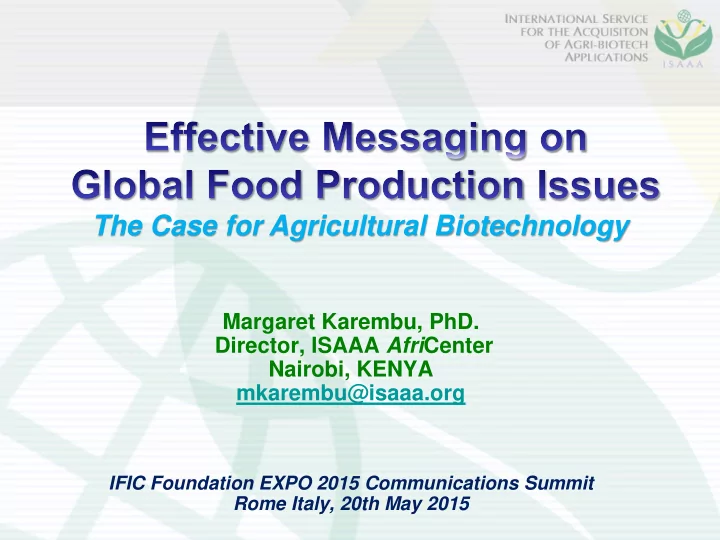

The Case for Agricultural Biotechnology Margaret Karembu, PhD. Director, ISAAA Afri Center Nairobi, KENYA mkarembu@isaaa.org IFIC Foundation EXPO 2015 Communications Summit Rome Italy, 20th May 2015
Presentation Overview • THE GLOBAL CHALLENGE • GLOBAL ADOPTION 1996-2014 (19 YEARS) • PROGRES IN AFRICA • LESSONS FROM ABBC-2015 ON EFFECTIVE MESSAGING
ISAAA---www.isaaa.org • A Not-for-Profit Charity, co-sponsored by public and private sector organizations • ISAAA is a Pro-Choice Organization • Share knowledge on crop biotechnology FREELY whilst respecting the rights of others to make their own decisions • Ensure global society is well informed about the attributes and potentials of crop biotech applications
ISAAA’s Global Knowledge Sharing Initiative (www.isaaa.org/kc) Network of 24 Biotechnology Information Centers (BICs) ISAAA is a Pro-Choice Organization Russia ISAAA AmeriCenter Spain China Japan Italy Pakistan Bulgaria Bangladesh Egypt Mali India Vietnam Thailand Philippines Sri Lanka Burkina Faso Kenya Uganda ISAAA’s Global KC Malaysia Indonesia Brazil South Africa Knowledge and Experience Sharing
THE GLOBAL CHALLENGE DOUBLE food production by 2050 with LESS resources: WATER, NITROGEN etc. Population will reach 4 billion in 2100 in Africa, (currently: 1.1billion). Where will the food come from?
Challenge cont…… 65% of Africa’s labour workforce is employed by agriculture Ageing farmers – Declining number of farmers The youth are shunning agriculture for white-collar jobs in cities
Global adoption(%) of principal GM crops (M Hectares, M Acres), 2014 M Acres M Ha. 494 200 184 445 Conventional 180 395 160 GM 346 140 111 296 120 247 100 198 80 140 60 37 36 99 40 49 20 0 0 82% 68% 30% 25% Soybean Cotton Maize Canola Source: Clive James, 2014 Superficies Based on FAO preliminary data for 2012.
Biotech commercial Africa Status of Biotech Crops’ planting 2014 South Africa - Maize, cotton, I S A A A soybean Burkina Faso – Cotton Sudan - Cotton Pipeline Biotech crops CFTs RSA – maize, potatoes, sugarcane, Cameroon: cotton Kenya – cassava, cotton, maize, sorghum, swetpotato Ghana- cotton, cowpea, rice Egypt – cotton, wheat, potato, cucumber, melon Uganda - banana, cotton, 3 countries; 3 crops; cassava, maize, rice 3.3Million hectares in 2014 Nigeria - cowpea,cassava,sorghum
Challenges in Agri-biotech Communication in Africa ABBC-2015 Availability Agri-biotech and Biosafety Access Communication Conference Packaging Stock-taking on 2 decades of Knowledge gaps biotech communication
Reaching out to Farmers Lesson 1: Simplification of language MESSAGING FOR FARMERS • Increased productivity • Reduced cost of production • Increased environmental tolerance- DROUGHT Best Practices • Better markets Seeing-is-believing study tours Generate language with farmers Most effective channel is Radio
Lesson 2: Mass media sensations… Create: Fear Anxiety Mistrust Derails policy Best practice: Media are key partners, enhance their capacity for accurate messaging
Lesson 3: Messaging for Policy makers: Relevance Best Practice: Showcase successful case studies through seeing-is-believing study tours Build Champions for sustained political support Engage consistently!
Production of Major Crops: Africa versus Global (2013) Crop Year Maize Sorghum Pulses Banana Cassava 2013 2 0.9 0.6 11.3 11.5 Yield (t/ha) (Africa) 2013 5.4 1.4 0.9 21 13.5 (Global) Message: Source: http://faostat3.fao.org Africa needs all proven tools including agri-biotech to raise productivity, encourage youth involvement and create wealth in agriculture
Africa is a leader in ICT, can lead in Agri-biotechnologies too Phenomenal penetration of Mobile phones, INTERNET Mobile money – MPESA a WINNER; Source: http://www.africaprogresspanel.org
Recommend
More recommend